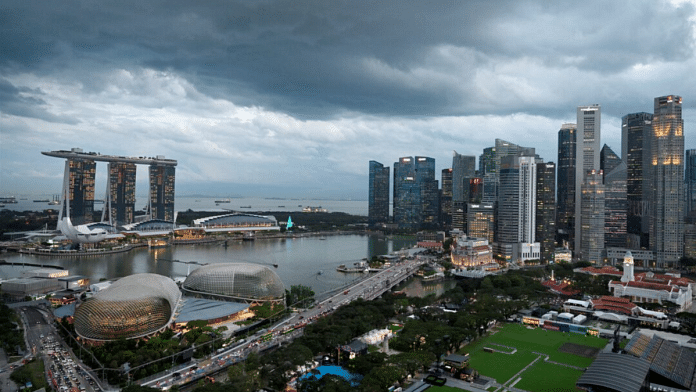Thank you dear subscribers, we are overwhelmed with your response.
Your Turn is a unique section from ThePrint featuring points of view from its subscribers. If you are a subscriber, have a point of view, please send it to us. If not, do subscribe here: https://theprint.in/subscribe/
Relationships between the major nations of Southeast Asia—Indonesia, Malaysia, Thailand, and Singapore—are greatly influenced by the interplay of soft power dynamics. These countries have different national identities, political structures, and economic models despite their historical and geographic similarities. Soft power, which includes diplomacy, cultural sway, and economic collaboration, has become an essential instrument for these nations to manage their bilateral and international connections. A key element of soft power is cultural diplomacy, which enables countries to promote their beliefs, customs, and way of life in order to develop respect and understanding amongst people. The relationships between Singapore, Malaysia, Thailand, and Indonesia have been strengthened throughout Southeast Asia thanks in large part to cultural exchanges.
With such a rich and cosmopolitan population, Singapore uses cultural diplomacy to mend fences with its neighbours. Regional artists and intellectuals participate in the city-state’s promotion of its multiculturalism, which is demonstrated by events like the Singapore Writers Festival and the Singapore Biennale. These venues promote regional harmony and understanding in addition to showcasing Singapore’s vibrant culture.
Thailand, a nation renowned for its deep cultural traditions, has improved its ties with its neighbours by employing cultural diplomacy. Positive perceptions of Thailand are bolstered by these cultural exchanges, which also promote collaboration in other domains like trade and tourism.
Another important facet of soft power in Southeast Asia is economic cooperation. The common destiny that has been sparked by the economic interdependence of Singapore, Malaysia, Thailand, and Indonesia has propelled efforts towards regional integration. Singapore is essential in this respect because of its developed economy and standing as a major international financial centre. The city-state has strengthened economic relations and supported regional stability through its investments in Malaysia and Indonesia, especially in fields like infrastructure, real estate, and technology.
Malaysia has established itself as a major force in the regional economy thanks to its advantageous location and strong manufacturing sector. Its economic policies have improved relations with both Thailand and Indonesia by promoting trade and investment within the ASEAN framework. These partnerships have been strengthened through cooperative economic projects like the Malaysia-Thailand Joint Development Strategy, which has improved regional economic integration.
Thailand’s dedication to regional cooperation is demonstrated by its expanding influence in regional economic forums and its calculated investments in its neighbours. Thailand’s investment in infrastructure projects in Indonesia and Malaysia’s creation of cross-border economic zones are two examples of how economic cooperation can promote regional integration.
Southeast Asia’s largest economy, Indonesia, has significant economic sway over the other countries in the area. Its dedication to promoting regional economic cooperation is evidenced by its leadership in programs like the ASEAN Economic Community (AEC). The importance of economic interdependence in determining regional dynamics is shown by Indonesia’s expanding trading links with Malaysia, Singapore, and Thailand.
In Southeast Asia, political diplomacy plays a vital role in navigating complex relationships between Singapore, Malaysia, Thailand, and Indonesia, addressing territorial conflicts, environmental issues, and shared security needs. Through soft power, these countries foster regional stability and cooperation.
Singapore positions itself as a neutral mediator, exemplified by its role in ASEAN-China talks on the South China Sea, reinforcing its soft power influence by promoting peaceful conflict resolution. Malaysia, with its longstanding diplomatic ties, strengthens regional bonds through initiatives like addressing haze pollution with Indonesia and supporting peace in southern Thailand, enhancing its regional influence. Thailand, meanwhile, leverages its diplomatic relationships within ASEAN to foster collaboration, exemplified by the Mekong-Ganga Cooperation, furthering regional connectivity and stability. Through these diplomatic efforts, each country uses soft power to address regional challenges and build resilient alliances. Indonesia is a major soft power in the region due to its democratic governance and active participation in international forums. Indonesia’s dedication to preserving peace and stability in Southeast Asia is demonstrated by its leadership in advancing regional security, especially through its participation in ASEAN-led efforts. Through strengthening ties with Singapore, Malaysia, and Thailand, Indonesia has promoted regional cohesion through its diplomatic initiatives.
The dynamics of soft power are crucial in shaping relationships among Singapore, Malaysia, Thailand, and Indonesia, helping these countries build mutual understanding, strengthen economic ties, and address regional challenges through cultural diplomacy, economic cooperation, and political diplomacy. Regional cooperation has been enhanced through the peaceful resolution of disputes, leveraging soft power to avoid escalation and promote harmony.
For instance, Singapore and Malaysia have managed territorial disputes, including the Pedra Branca dispute, through diplomatic channels rather than confrontation, setting an example of soft power in action. Similarly, Malaysia and Indonesia have worked together diplomatically to address the transboundary haze crisis, balancing environmental concerns with neighbourly cooperation. Thailand, in its role within ASEAN, has fostered collaboration to address shared issues in the Mekong region, ensuring a coordinated response to regional challenges.
In cultural diplomacy, these nations also support each other’s heritage preservation efforts. Singapore and Malaysia, for example, jointly celebrate shared cultural elements like food heritage, bolstering their ties. Thailand and Indonesia have collaborated in promoting traditional arts, recognizing each other’s cultural contributions to regional identity. As Southeast Asia continues to evolve, soft power will be instrumental in fostering regional integration and ensuring stability, enhancing these countries’ influence both regionally and on the international stage.
These pieces are being published as they have been received – they have not been edited/fact-checked by ThePrint.


